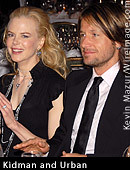LAST Sunday, Nicole Kidman married Keith Urban in the Cardinal Cerretti Chapel at Manly. We wish them well and hope they are blessed.
Outsiders today often find Catholic rules about sexual activity and against divorce as strict and demanding. In the past, most Christians recognised these same standards but people still admire Catholic marriage ceremonies.
The Catholic rituals surrounding the sacraments (seven special celebrations at different moments during a lifetime) go back to the time of Christ and the apostles, nearly 2000 years ago.

Unlike some other religions, love is at the heart of Christianity, and the prayers, blessings and scripture readings at a wedding generally reflect this conviction that human love is like a flame from the heart of God Himself.
ReplyDeleteA baptised couple minister the sacrament to each other through their promises, while the priest is there as the chief witness.
St Patrick's College, Manly, is a grand, multi-storeyed sandstone building where for 112 years Catholic seminarians prepared to be priests. It is still owned by the Church, but is a business college.
One retired priest said to me that as a student, he never dreamt that one day a famous divorced Catholic film star would be married in their chapel.
Marriage and the family have changed enormously, even in my lifetime.
Now I feel the need to explain to those requesting a Catholic marriage that Christian marriage is an exclusive union of a man and a woman for life, for "richer or poorer, in sickness or in health''.
One shouldn't enter marriage intending to remain only as long as lovelasts.
These Christian basics are no longer universal.
The Urban-Kidman wedding also provoked several complaints querying how Nicole, who was married to Tom Cruise for nearly 10 years,could be married in a Catholic church.
Christ spoke against divorce, so Church annulments judge whether Church requirements for validity were ever present.
The same rules apply to everyone. The process is inexpensive, and Catholics caught up in divorce should check through their local diocesan tribunal to see if an annulment is possible.
Grounds for annulment are various, and advice from a Church (or canon) lawyer is always useful.
Some cases are simple: eg. a Catholic who marries civilly fails to observe the essential form of marriage.
Most annulment cases are complex, however, centring on consent and the areas of gross immaturity and incapacity for the covenant.
Marriage is too important for easy entry or departure. Catholic annulment rules may be controversial, but they are generally clear.
In an imperfect world, they're an attempt to cope with the tragedy of marriage breakdown.
The Sunday Telegraph